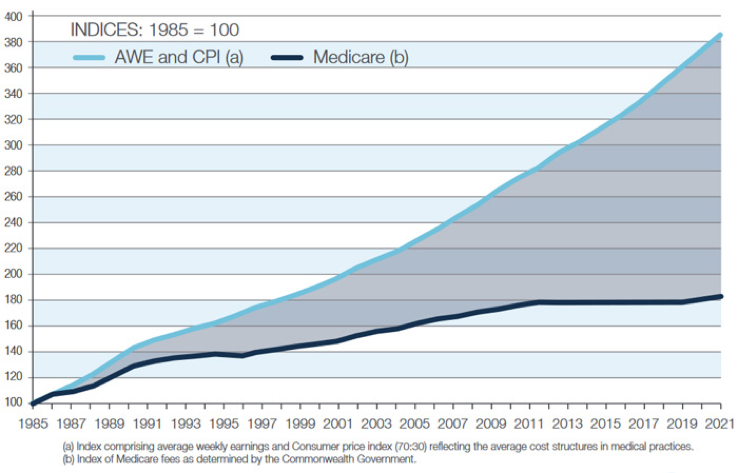Overview of Private Operation Fees
This section aims to provide you with some basic financial information about the Private Health system. There is universal health cover in Australia from Medicare. This means that all Australian residents are covered by the public health system.
The private health system offers the advantage of choosing your surgeon, reduced waiting periods and access to a better choice of surgery that may not be available in the public sector. The disadvantage is the financial costs associated with surgery. Most doctors’ costs are paid for by Medicare and health insurance companies supplement a little to this. In fact most of your health insurance goes into paying for your hospital stay and not the doctor’s costs.
There are several costs when seeing a specialist surgeon:
- Initial Consultation Fee – $250
- Review Consultation Fee – $150
- Cost of Surgery – This depends upon your procedure, health fund and coverage.
ORTHOPEDIC SURGERY COSTS
There are several costs to surgery. Most patients believe the bills they are paying are for the surgeons. In reality there are multiple providers who are sending out bills to the patients and the health insurance company:
- Surgeon’s Fees – Mr Slattery bills typically a proportion of the AMA Fee – this depends upon your health fund
- Anaesthetist’s Fees (the specialist who provides the anaesthetic to the patient) – Most anaesthetists charge gaps varying from $250 to $1000. Your anaesthetist will contact you prior to surgery and obtain informed financial consent.
- Assistants Fee (this is the doctor who assists the surgeon) – Most assistants will charge gaps between $100 and $350.
- Hospital bed and Theatre costs – If you have private health insurance this is confined to your excess, but certain orthopaedic procedures are excluded from your policy and therefore need to be checked prior to booking in surgery.
- Pathology and Radiology – These are blood tests and imaging taken during your inpatient stay that may also incur added costs.
- Implants and Prosthesis – Most of these are covered by your insurance company, but once again it is important to check with them prior to the surgery
Most orthopedic surgeon consultation fees and procedures are covered by Medicare item numbers, therefore, as long as you are covered by medicare, you receive a rebate from most services.
Surgeon’s Fees
All orthopaedic surgeries are covered by Medicare item numbers. These numbers have an associated rebate. The government determines these rebates and the private health insurance companies supplement these rebates by up to 25%.
Unfortunately, these rebates have not changed much since 1983 and have not kept up with inflation, let alone the costs of running a quality practice and the increasing cost of indemnity insurance. The difference between the costs and the rebates has given rise to the GAP. Most surgeons will charge AMA (Australian Medical Association) rates for the services. This is almost three times the Medicare rebate and reflects the true discrepancy.

GAP Payments
The GAP is the difference between what the health insurance rebate on a procedure is, and what the surgeon charges. Dr Slattery aims to minimise this amount wherever possible, so please don’t hesitate to discuss orthopedic surgeon costs with him at your consultation.
For further explanation of the GAP:
Health Insurance “Junk Policies”
So-called “junk policies” provide cover for restricted in-patient services; typically the minimum required to qualify as a ‘compliant health insurance policy’. Having this type of policy allows the consumer to avoid paying the Medicare Levy Surcharge and Lifetime Health Cover loading. That’s why they are also referred to as ‘tax-avoidance’ policies. They typically have extensive ‘exclusions’, and anyone prior to taking out a policy should ensure that they read exactly what is included in their policy – including orthopaedic and joint replacement procedures.
In addition, even for the few services that are covered, they usually only provide benefits at public hospital rates. This means the patient either chooses a public hospital (with no out-of-pocket costs); or a private hospital with potentially significant out-of-pocket costs being the difference between the public hospital and private hospital fees.
Uninsured Patients
Uninsured patients will require a quote from the hospital and the prosthesis companies. Once again the surgeon’s fees are mainly rebated by Medicare and therefore the patient will not have to pay much out of pocket for their surgeon.
Dr Slattery regularly operates on uninsured patients, and we can discuss this option with you during your consultation.
How much does a hip replacement cost?
A hip replacement is one of the more costly reconstructive orthopedic surgeries. The total costs coming is around $25,000, but there are some Medicare rebates available that can impact this amount. There are other costs to consider such as scans, X-rays, blood tests, and additional services. P Again, the out of pocket costs will depend on the type of insurance you have and the gap between Medicare and your insurer.
Dr Slattery regularly operates on uninsured patients and he is more than willing to discuss this option with you during your consultation.
Payment Plans and Options
If you are uninsured but wish to have Dr Slattery perform your operation, we can arrange for a payment plan for you prior to surgery.
If you have any questions regarding payment or would like further information regarding billing etc please do not hesitate to contact Dr Slattery.

